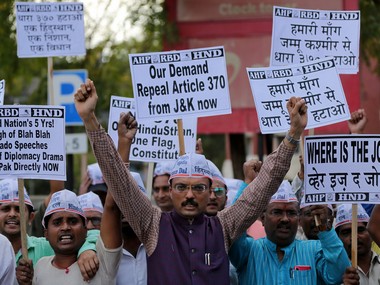On Monday, Union Minister for Home Affairs Amit Shah announced that Article 370 of the Indian Constitution is set to be abrogated. The Article, it may be recalled, grants special autonomous status to Jammu and Kashmir, and makes special provisions for the state that are not applicable to other states. Meanwhile, senior home ministry officials privately distributed a leaflet among some journalists that outlines the rationale for abolishing Article 370, stating, “[T]he provision empowering the state with ‘special’ status has always been the elephant in the room. Jammu and Kashmir, along with its sensitive topography, appears like a foreign policy issue, instead of a domestic one due to its status in our Constitution. There exists an unnecessary chasm between citizens of Kashmir and the rest of India.” The leaflet, that also elaborates on why
Article 35A must be abrogated, argues that ’the Constitutional relationship of India with [Jammu and Kashmir] has been adversely lopsided’ and that positive discrimination in Kashmir has tended to be ‘insidious’.
**_Follow LIVE updates on the situation in Jammu and Kashmir here_** The problem with Article 370 The leaflet notes that the rise of unemployment and terrorism in Jammu and Kashmir are consequences of Article 370’s existence. It states that “because of Article 370, there are very less industries, which is directly related to employment. This means that because of this provision, people have to migrate to other states in search of jobs. Also it has become a terrorist prone region because of this Article. Due to Article 370, RTE, RTI, CAG and many Indian laws aren’t applicable in Kashmir which has a situation of corruption.” [caption id=“attachment_6396641” align=“alignleft” width=“380”] Representational image. Reuters[/caption] The biggest sticking points of this contentious part of the Indian Constitution, as spelled out by the document are as follows: 1. Indian Parliament cannot make any law without the consent of state Assembly; 2. Jammu and Kashmir has its own flag and constitution; 3. President’s Rule cannot be proclaimed in that state — only Governor’s Rule can be imposed; 4. Jammu Kashmir has its own criminal code which is named the Ranbir Penal Code. The MHA’s document lays a large chunk of the blame for Article 370 at the door of former prime minister Jawaharlal Nehru and his ‘Himalayan blunder’ with Kashmir, and says that it is the biggest hurdle in the way of a ’lasting solution’ to the Kashmir conundrum. Furthermore, the leaflet blames the likes of the National Conference and Peoples Democratic Party for the continuation of the Article, stating, “Indeed, it is this opposition to the abrogation of Article 370 that Muslim-dominated Kashmiri political parties share. Unfortunately for them it is also what they have in common with separatists in the Valley.” Benefits of removing Article 370 According to the MHA’s publication, some of the biggest advantages of abolishing Article 370 are as follows: 1. The state, upon removal, will prosper economically and socially. 2. Social amalgamation will reduce the threat of militancy. 3. Kashmir could be one of the top tourist destination after complete development. 4. It will also prove to be good diplomacy to deal with Pakistan over territorial disputes. 5. It will politically give chance to all parties to rule the state and allow its development. The way forward — Constitution as a living document Taking cognisance of the fact that the way to repeal the divisive Article would be for the President of India to issue a notification, ‘but not without the concurrence of the Constituent Assembly of Jammu and Kashmir’. Noting that the Constituent Assembly disbanded in 1956 and that its members are ‘presumably dead’, the leaflet points out that the very same members neither recommended the abolition nor permanence of Article 370. “Article 370, via orders, has been modified so many times, it can be expelled from the Constitution as well without taking ‘concurrence’ of the now-defunct Constituent Assembly. The Constitution has been recognised as a living document, after all,” the publication adds.
On Monday, Union Minister for Home Affairs Amit Shah announced that Article 370 of the Indian Constitution is set to be abrogated
Advertisement
End of Article


)

)
)
)
)
)
)
)
)



